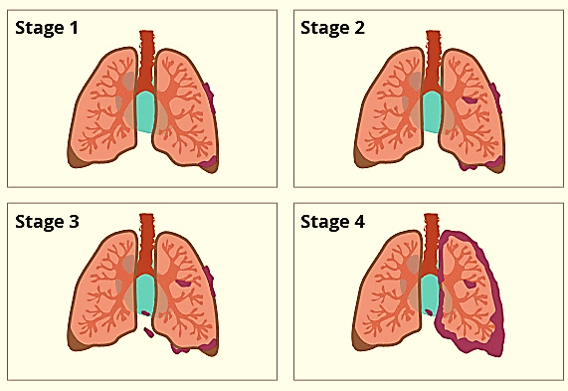pleural mesothelioma
pleural mesothelioma
- Pleura - Pleural mesothelioma is a cancer that develops on the lining of the lungs.
- mesotelioma pleural - It is very common asbestos mesothelioma cancer.
- Specialists use the latest therapies to treat it.
- lung cancer treatment - Clinical trials offer access to new treatments such as immunotherapy, genetherapy etc.
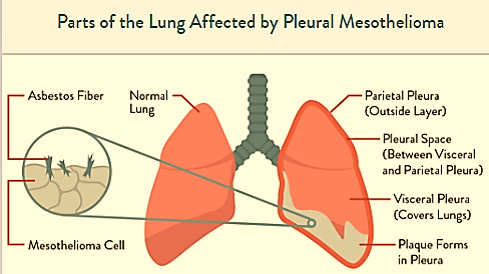
- mesothelioma causes - It is a malignant mesothelioma cancer caused by asbestos.
- mesothelioma life expectancy - The life expectancy of patients with pleural mesothelioma is less than 18 months, but some live little longer.
facts on pleural mesothelioma
- The pleural mesothelioma accounts for about 75 percent of mesothelioma cases diagnosed annually in U.S.
- More than 2,000 people are diagnosed with this pleural cancer each year.
- mesothelioma treatment - For this lung cancer, mesothelioma treatments include
- extrapleural pneumonectomy surgery,
- pleurectomy/decortication surgery,
- chemotherapy and
- radiation.
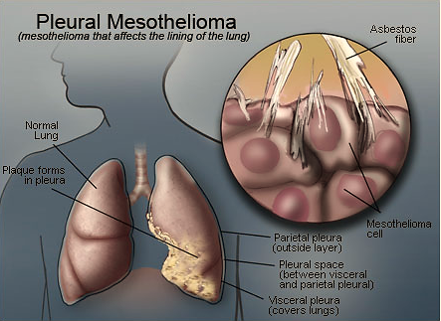
- Most treatment plans combined the three, which is called multimodal therapy.
- Depending on how far your cancer has progressed, these therapies can be
- cytoreductive - to control the cancer (or)
- palliative - to improve quality of life.
lung cancer symptoms
- Persistent dry or raspy cough
- Coughing blood
- Shortness of breath
- Pain in the lower back or rib area
- Painful breathing
- Lumps under the skin on the chest
- Difficulty swallowing
- Night sweats or fever
- Unexplained weight loss
- Fatigue
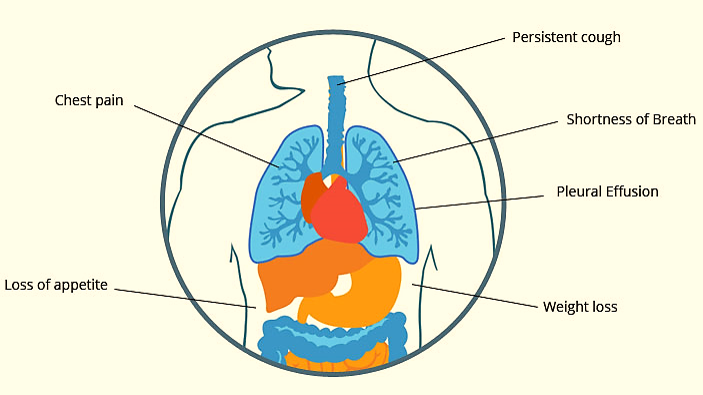
pleural mesothelioma causes - mesothelioma causes
- The only known major cause of any mesothelioma is exposure to asbestos fibers.
- Occupational asbestos exposure is the most common cause and there are only few cases due to exposure at home.
- Inhaled sharp asbestos particles get stuck in both the visceral (inner) or the parietal (outer) pleura.
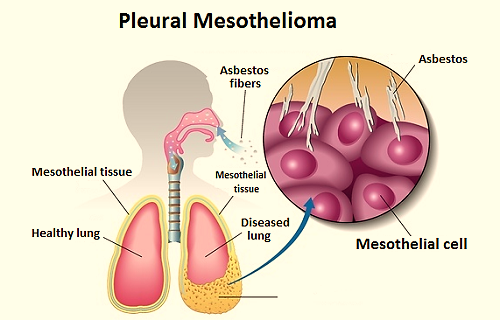
- The body cannot eject all of the asbestos fibers.
- These asbestos exposure will cause irritation, swelling, harmful genetic damage that turn cells cancerous.
- These cancerous cells grow fast and uncontrollably, forming asbestos disease - tumors around the lungs.
- It takes anywhere from 10 to 50 years after asbestos exposure for asbestos cancer to develop in the pleura.
What is pleural mesothelioma
Mesothelioma Location
- It is located in the linings of the lungs and the chest wall, known as the pleura.
- The major symptom is damage of the respiratory system in hand with shortness of breath.
- Others include spoiling the thoracic cavity combined with a chest paint.
Mesothelioma Treatment
The standard treatment for pleural mesothelioma is surgery to remove full/part of either the pleura or possibly the lung.
The surgery is combined with chemotherapy and/or radiation.
Mesothelioma Survival
The survival possibility is very poor, of about 1 year.
However, there are even few cases with long-term survival of 20 years.
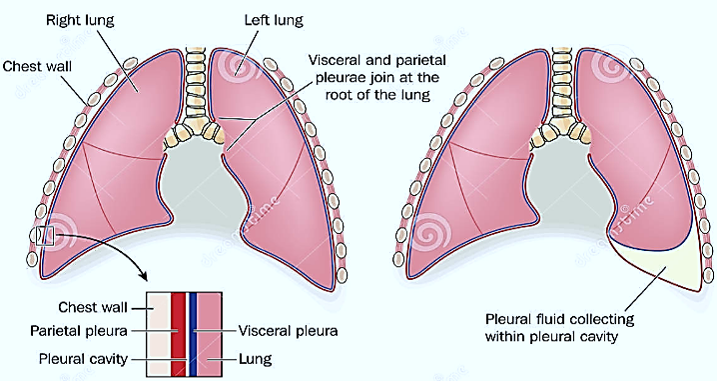
mesothelioma prognosis
- The mesothelioma diagnostic process begins with initial symptoms such as chest pain and breathing impairment
- A chest X-ray which shows fluid or tumors around the lungs needs advice from pulmonologist/oncologist.
- Further imaging, blood tests and tissue biopsies confirms a pleural mesothelioma diagnosis.
- The most reliable tool to diagnose the disease is a thoracoscopy.
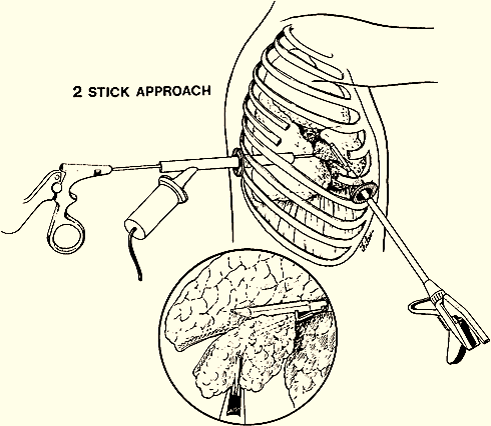
- This invasive procedure allows doctors to view the patient's chest through a small camera.
- A tissue sample is collected, known as a biopsy.
- A pathologist will evaluate the biopsy, distinguish the cancer’s cell type and confirm the diagnosis.
plueral mesothelioma treatment
lung cancer prognosis - Plueral Mesothelioma is treated using a combination of three types of therapy:- Surgery – Cytoreduction surgery (“debulking”) to remove as much cancer cells possible.
- Chemotherapy – A combination of chemotherapy drugs to kill remaining tumor cells.
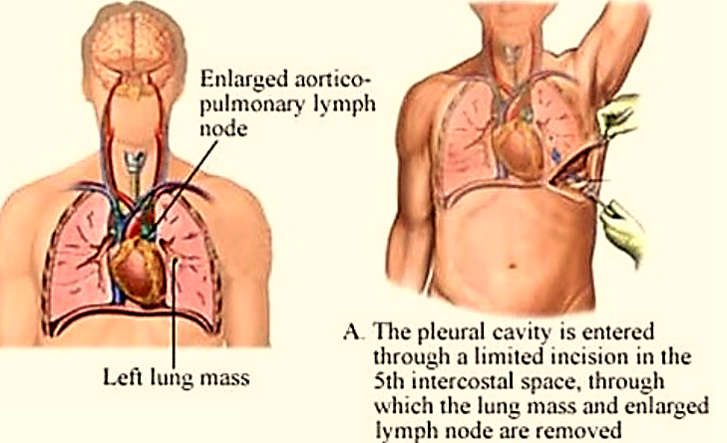
- Radiation – A blast of radiation to shrink tumors in the body.
treatments for plueral mesothelioma
Pleurectomy/Decortication (P/D):
- Surgery to remove the parietal pleura (the outer membrane)
- Removal includes nearby organs and tissue, such as the mediastinum, diaphragm, and pericardium.
- It is not considered a curative operation.
- It is listed as a palliative treatment as it is less harmful and less painful.
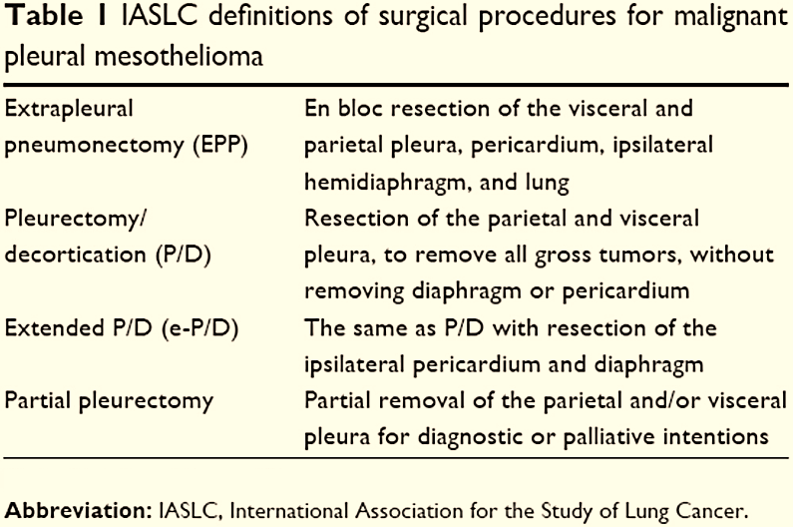
Extrapleural Pneumonectomy (EPP):
- Patients with better physical condition undergo EPP.
- This is a curative treatment that removes the affected pleura.
- Removal includes a portion of the lung, nearby lymph nodes, and adjacent tissue.
- It is the only type of surgery associated with long-term survival.
pleural mesothelioma stages
- Staging systems for malignant pleural mesothelioma defines four stages.
- These are labeled I, II, III and IV.
- The first two stages indicate localized tumors.
- The last two stages classify spreading tumors.
- The International Mesothelioma Interest Group created the most widely used staging system.
- It applies the tumor-node-metastasis (TNM) approach.
- Two others with less usage are
- the Brigham and Women’s staging system and
- the Butchart staging system.
